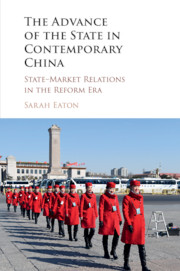Book contents
- Frontmatter
- Dedication
- Contents
- List of figures
- List of tables
- Preface
- Acknowledgements
- 1 The advance of the state in China: the power of ideas
- 2 The ideas behind the advance of the state
- 3 The state's advance in the air: an analysis of airline reform
- 4 Advance of the state in telecommunications: the bricolage of managed competition
- 5 Is the state's advance coming to a halt?
- Bibliography
- Index
3 - The state's advance in the air: an analysis of airline reform
Published online by Cambridge University Press: 05 December 2015
- Frontmatter
- Dedication
- Contents
- List of figures
- List of tables
- Preface
- Acknowledgements
- 1 The advance of the state in China: the power of ideas
- 2 The ideas behind the advance of the state
- 3 The state's advance in the air: an analysis of airline reform
- 4 Advance of the state in telecommunications: the bricolage of managed competition
- 5 Is the state's advance coming to a halt?
- Bibliography
- Index
Summary
This chapter examines a puzzling policy reversal in the course of airline reform. While the airline industry now belongs to a small group of ‘lifeline’ industries characterized by oligopoly among a small number of central SOEs, the initial reform pathway in airlines in the post-Mao era hinted at a very different future. Indeed, a core puzzle in the study of China's reform-era airline industry is why the trajectory of gradual state retreat was abruptly reversed in 1997 when regulators began a bold retrenchment leading finally to an administrative restructuring of the industry around the ‘Big Three’ state-owned carriers. The chapter finds that this policy reversal was shaped strongly by the policy backdrop discussed in the previous chapter, namely central policymakers' increasing emphasis on developing a national team of state-controlled national champions which gained momentum in the late 1990s.
As previous analyses of Chinese airline policy have argued, the occurrence of an industry crisis on the heels of a ticket price reform in the late 1990s was the proximate cause of market restructuring around the ‘Big Three’ state-owned airlines. Yet the move to oligopoly was shaped by more than just a normative preference for orderly markets. The creation of a state-owned oligopoly was part and parcel of a broad-based effort to bolster the market position of large SOEs in key industries under the banner of the ‘large enterprise group strategy.’ In recent years, the national champions mandate has only become more prominent in airline policy, even as the industry regulator has nominally retreated from the market.
The Maoist legacy and the early reform period
Civil aviation in China was ravaged by the succession of political campaigns that defined the Mao years. Between 1950 and 1976, the Civil Aviation Administration of China (CAAC) fell under the authority of, variously, the Central Military Commission, the State Council and the Ministry of Transportation before winding up as a division of the Air Force after 1969. In the latter half of the 1960s, many cadres in the CAAC became targets for the Red Guard attacks and those linked to the ‘Two Airlines Uprising’ (lianghang qiyi 两航起义) were treated especially harshly. Management of civil aviation was increasingly haphazard as the Cultural Revolution wore on.
- Type
- Chapter
- Information
- The Advance of the State in Contemporary ChinaState-Market Relations in the Reform Era, pp. 53 - 78Publisher: Cambridge University PressPrint publication year: 2015



